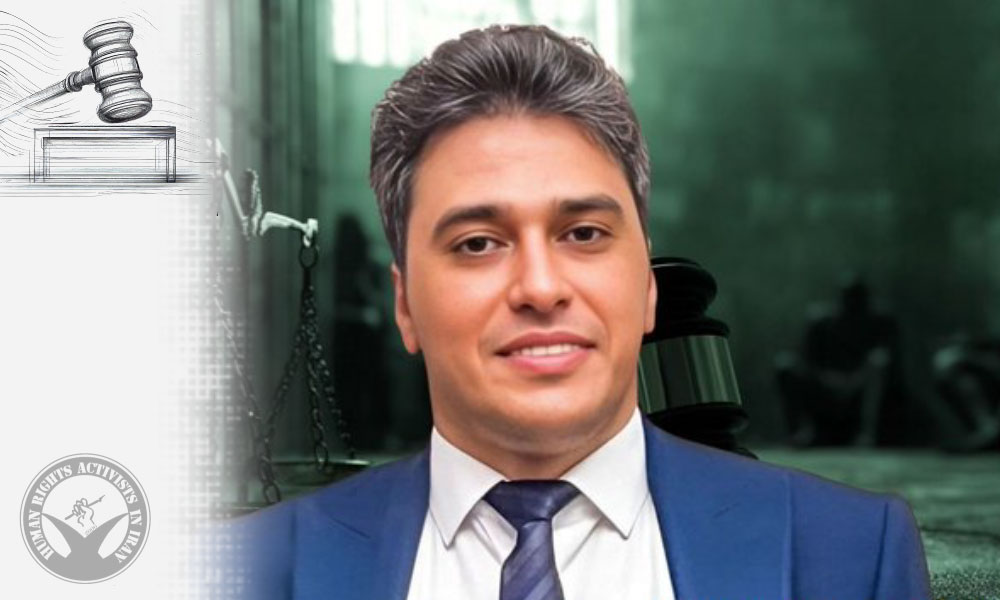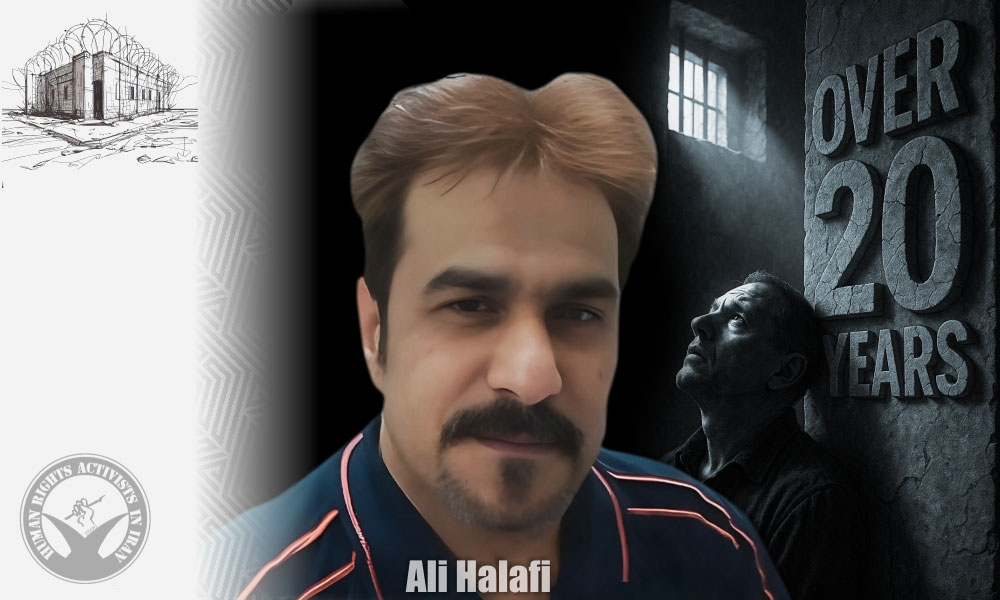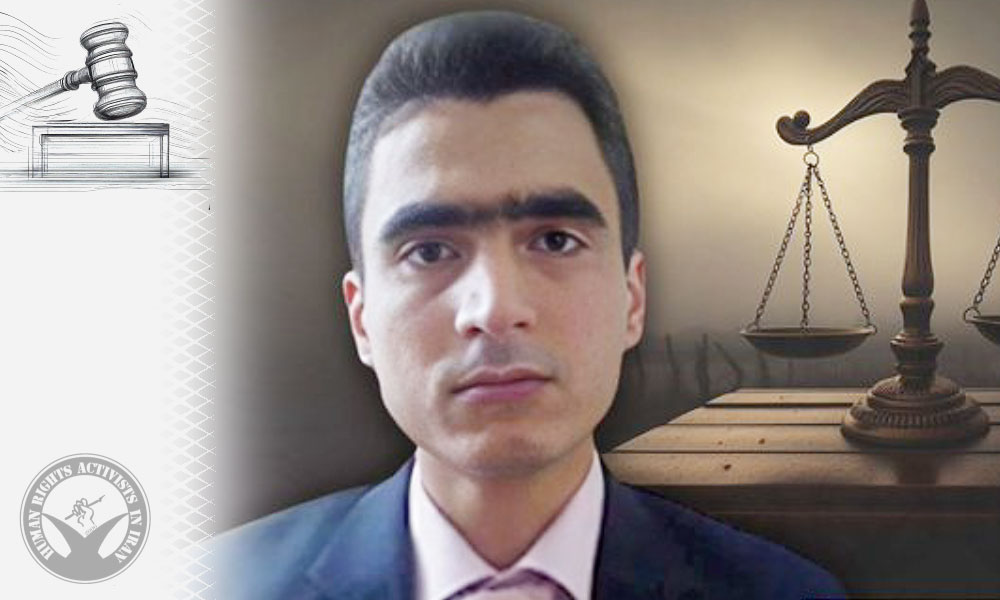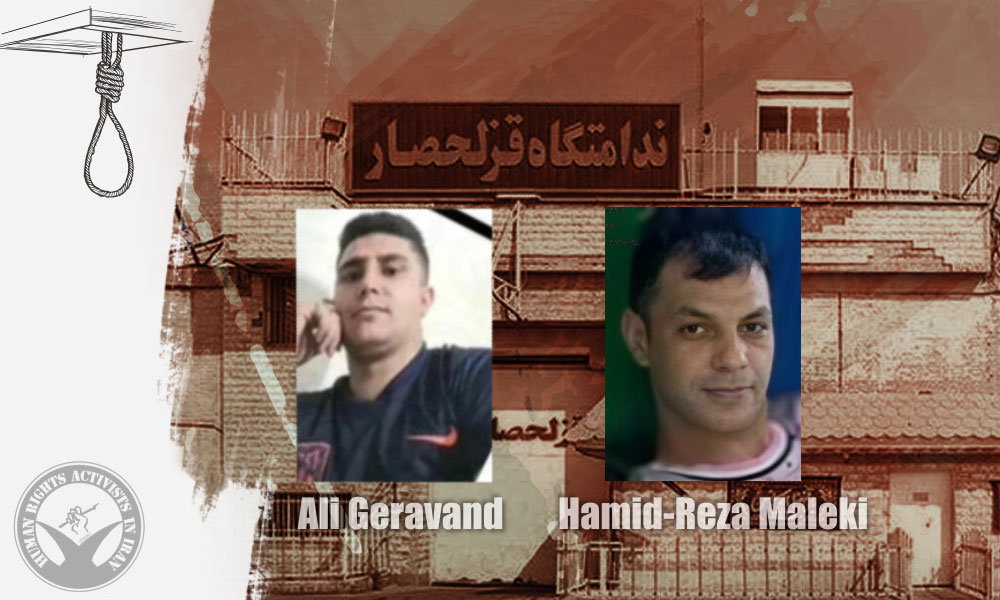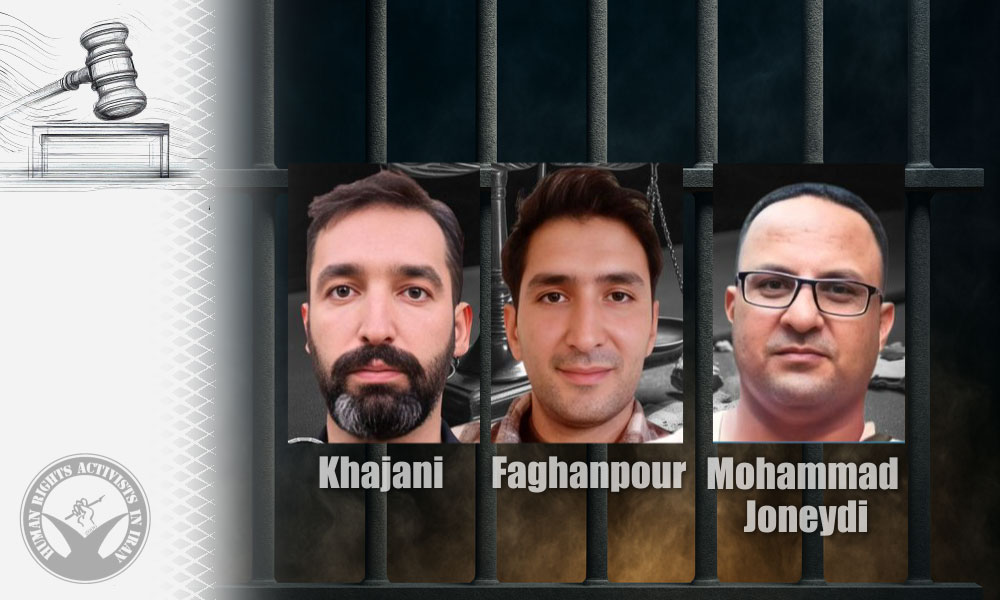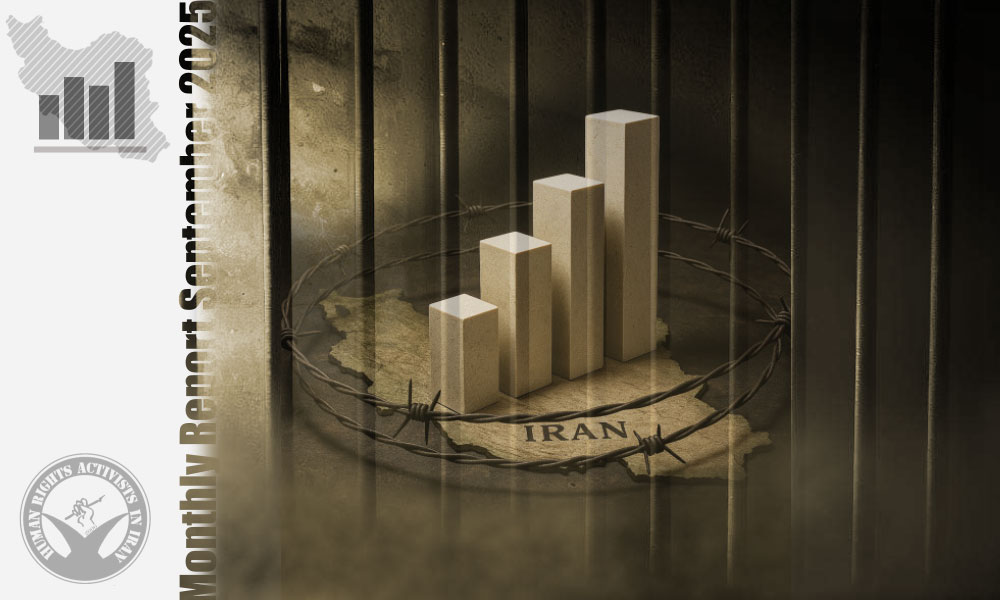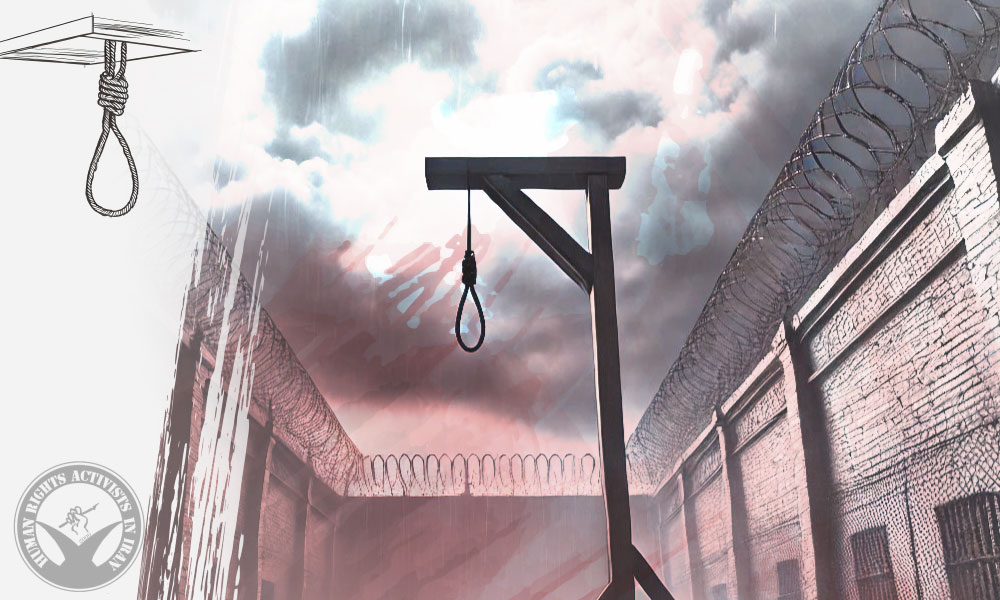HRANA– This report reviews documented cases of human rights violations in Iran in September 2025, based on statistics compiled by HRANA, the news agency of Human Rights Activists in Iran. The sharp rise in executions during this month, the arrests of minors, and the alarming reports of prisoner deaths in Qarchak Prison of Varamin were among the most notable human rights violations recorded.
Executions
In September, Iranian prisons recorded 183 executions, marking the highest monthly total since the start of the year. According to HRANA, the executed included 164 men and 6 women, while the gender of 13 prisoners remains unverified due to the lack of official announcements.
At least 9 Afghan nationals were among those executed, bringing the total number of Afghan citizens executed in Iran since the beginning of this year to 50.
Of those executed, 92 prisoners had been sentenced to death on drug-related charges, and 83 were executed on murder charges. Since the beginning of this year, the Iranian regime’s judiciary has executed 486 individuals on drug-related charges.
In addition, two individuals, including Babak Shahbazi, were executed on the political charge of “enmity against God” (Moharebeh). For Babak Shahbazi, “intelligence and security collaboration with Israel” was cited as an instance of this charge.
Furthermore, one prisoner was executed on politico-religious charges, and another on security-related charges. The charges against four prisoners remain unknown.
In September, the Iranian regime’s judiciary issued death sentences against ten individuals, including one woman. The gender of two of those sentenced to death remains unknown. Among these cases is the concerning news of the Supreme Court’s confirmation of the death sentence against Peyman Farah-Avar, a poet from Gilan.
Additionally, one individual in Yasuj has also been sentenced to execution in public.
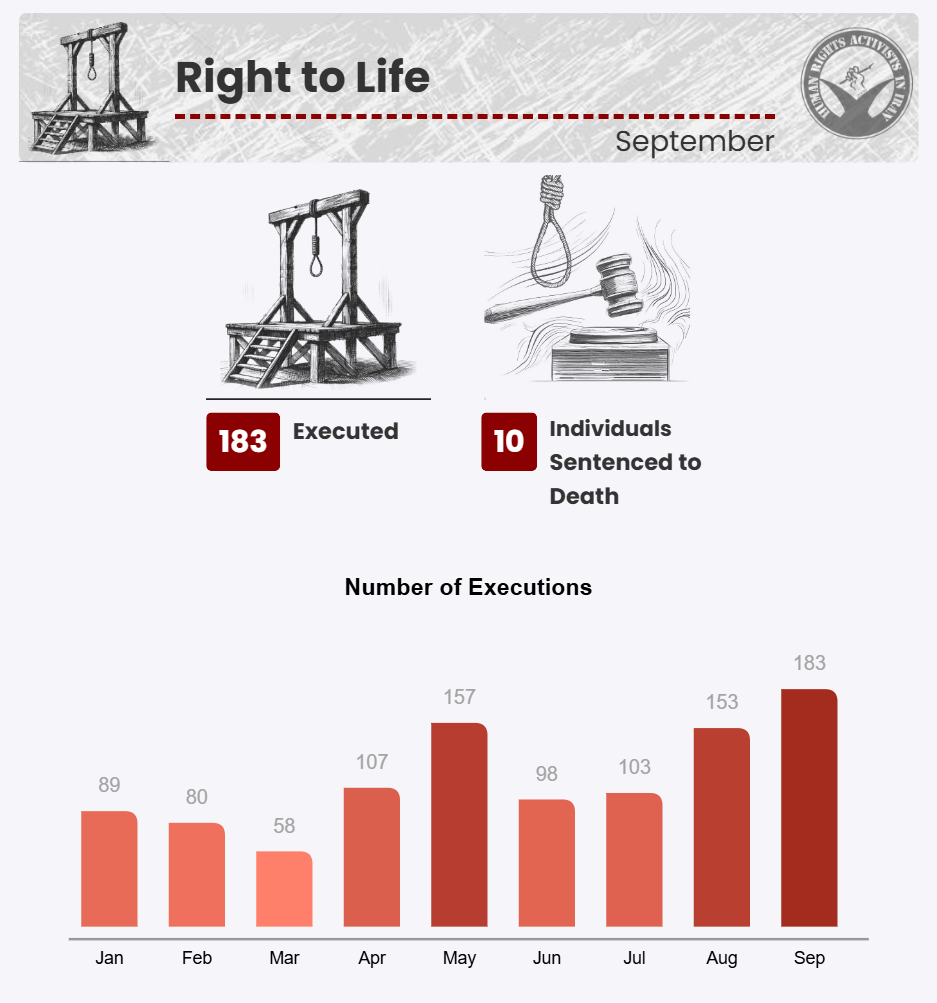
Prisoners’ Rights
In September, six prisoners died in Iranian prisons due to illness and the lack of adequate or timely medical care. Among these cases, HRANA reported the consecutive deaths of three women in Qarchak Prison of Varamin. One of them, Somayeh Rashidi, who had been arrested in Tehran for writing slogans, died as a result of delays in being transferred to a hospital.
In addition to the above cases, in September HRANA documented 31 reports of political and religious prisoners being denied medical care in prison.
The detention of political and religious prisoners under harsh and unsuitable conditions is another recurring instance of rights violations in Iran’s prisons. Among such cases is the detention of the British couple, Craig and Lindsay Foreman, in poor conditions, including being held in an overcrowded ward lacking proper sleeping arrangements.
Other instances of prisoners’ rights violations reported by HRANA this month regarding political prisoners and prisoners of conscience include: 45 cases of holding prisoners in legal limbo, 14 cases of families being denied information about the condition of their detained relatives, 44 reports of prisoners being transferred to solitary confinement, 2 cases of denial of access to a lawyer, 13 cases of denial of visitation rights, and 8 cases of pressure and threats against prisoners.
In response to such violations, some prisoners resort to hunger strikes. In September, HRANA documented 4 hunger strikes and 2 cases of suicide among prisoners (political and non-political).
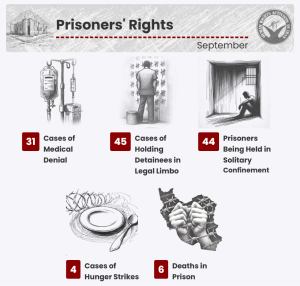
Kolbars and Fuel Carriers
In September, 15 citizens lost their lives as a result of indiscriminate shootings by military and security forces – a figure that is three times higher than the previous month. Since the beginning of this year, military forces, particularly in border areas, have taken the lives of 77 people.
Of those killed this month, five were fuel carriers (sukhtbar) and one was a kolbar (cross-border porter). In addition, 13 others were injured as a result of these indiscriminate shootings, including two kolbars and three fuel carriers.
In addition, landmine explosions in September caused the death and injury of four Iranian citizens. Among the victims were two teenage brothers killed in Mirjaveh, located in Sistan and Baluchestan Province.
Freedom of Thought and Expression
In September, 34 individuals were arrested by security forces for expressing their opinions and beliefs. Additionally, 15 people were summoned to security agencies and 23 others to court.
Among those arrested were three lawyers in Gilan Province: Shahrzad Sharabiyani, Shadi Falahati, and Hesam Pourahmadi. Furthermore, ten other lawyers in this province were also summoned to security and judicial authorities.
During the same month, 14 people were tried on similar charges, and convictions were issued against 23 individuals, resulting in a total of 868 months of prison sentences as well as a ruling of 38 lashes.
Regarding freedom of expression, eight protest gatherings were held in September, while in one case security forces prevented a ceremony and gathering from taking place. During the same month, the Press Court also tried the managers of three media outlets as well as a member of parliament.
Workers’ Rights
In September, HRANA documented 122 workers’ protest gatherings and two labor strikes, including strikes by workers in the oil and gas industries. According to these reports, more than 5,100 workers stated that they have not received their overdue wages.
Additionally, a labor activist was sentenced to 72 months in prison.
Also, workplace accidents in September claimed the lives of 35 workers and left 69 others injured. Since the beginning of this year, 280 workers have lost their lives in workplace incidents.
In September, trade associations and unions held 68 protest gatherings and two strikes. In one case, a teachers’ gathering was met with mass arrests and the confiscation of personal belongings. A total of 19 people were arrested, and 10 individuals faced convictions in court. HRANA also documented the closure of 29 commercial establishments during this month.
Women’s Rights
Among the most serious violations of women’s rights this month were the killings of three women, including a 35-year-old woman in Saqqez who was set on fire by her husband and died. In addition, a woman in Khomam, Gilan Province, was the target of an acid attack.
A man was also murdered in a so-called honor killing, and one case of sexual assault was reported.
Furthermore, the Iranian regime sealed eight commercial establishments for allegedly failing to enforce mandatory hijab regulations.
Children’s Rights
In September, Iranian security forces arrested 11 minors under the age of 18.
During the same month, the killings of seven children were reported, including the murder of a teenage girl in Shadegan in an honor-related killing.
Additionally, the deaths of two children and injuries to two others were reported as a result of the negligence of state authorities.
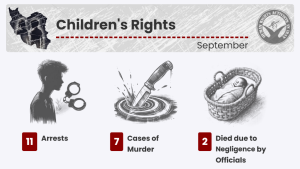
Religious Minorities
In September, security forces arrested one member of a religious minority. Additionally, the Iranian judiciary sentenced eight members of religious minorities to a combined total of 701 months in prison. In one case, Loghman Amini, a Sunni cleric, was sentenced to imprisonment and stripped of his clerical status.
HRANA also documented six court summonses and one case of a house search targeting religious minorities during this month.
Ethnic Rights
In September, 21 members of ethnic minorities were arrested by security forces. Among them was Peyman Ebrahimi, an Azerbaijani-Turk activist.
HRANA also reported two summonses to security agencies, two court summonses, and one case of physical assault carried out by security forces against members of ethnic minorities.
Inhuman Punishment
In September, the Iranian regime issued a total of 642 flogging sentences, along with one case of shame parading of a defendant in the city of Borujerd, and a ruling for amputation – all examples of inhuman punishments.




